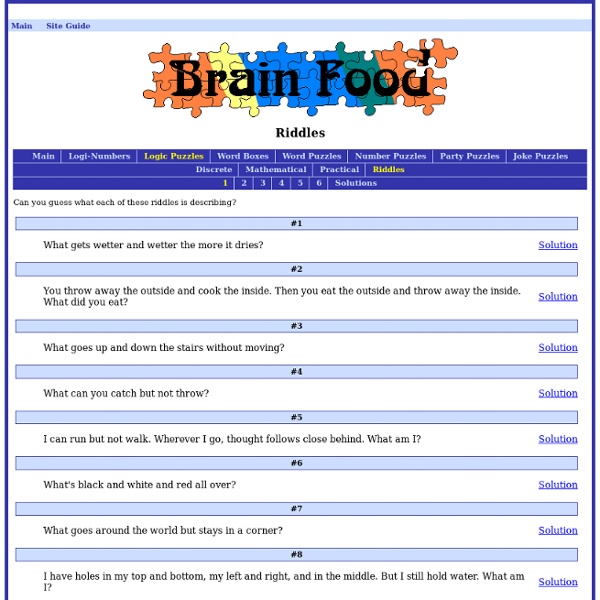



http://www.rinkworks.com/brainfood/p/riddles1.shtml
Related: Activities • engelskaChecking Understanding Analysis of the language consists of two sub-stages, often known as highlighting and concept checking. Highlighting is taking the model sentence and showing, telling or eliciting what the problems are in terms of form, function, and phonology. Concept checking is checking the understanding of difficult aspects of the target structure in terms of function and meaning. Concept checking is vital, since learners must fully understand the structure before any intensive practice of form and phonology is carried out.
Fun 4 the Brain - English Games English Excitement! Panda Mayhem This fun English game has some silly pandas to help teach the parts of speech. Get enough of the questions correct, and you can make your own silly sentence. Sharlayne Overton, author of A Daily Dose of Writing, came up with the concept for this game. Lexical Approach 1 - What does the lexical approach look like? Introduction The theory of language Principle 1 - Grammaticalised Lexis Principle 2 - Collocation in action About the authors Further Reading Introduction The principles of the Lexical Approach have been around since Michael Lewis published 'The Lexical Approach' 10 years ago. It seems, however, that many teachers and researchers do not have a clear idea of what the Lexical Approach actually looks like in practice. In this first of two articles we look at how advocates of the Lexical Approach view language.
One Lesson at a Time.": MONDAY MORNING DIFFERENTIATION IDEAS! MONDAY MORNING DIFFERENTIATION IDEAS!Great ideas to differentiate and integrate the real world into your curriculum and create a rigorous learning environment! Before I begin sharing this week's samples of activities that have worked successfully for me; I wanted to share a poster I created with self-reflective questions for classroom teachers. State exams, new curriculum, and a multitude of new standards have presented an overwhelming amount of work, organization and restructuring of how we approach education today.
Lexical Approach 2 - What does the lexical approach look like? Introduction The theory of learning Noticing Language awareness About the authors Further Reading Introduction The principles of the Lexical Approach have been around since Michael Lewis published 'The Lexical Approach' 10 years ago. It seems, however, that many teachers and researchers do not have a clear idea of what the Lexical Approach actually looks like in practice. Prepositions: Vocabulary for Beginning Readers Vocabulary for Pre and Beginning Readers Basic vocabulary is necessary for a child as they begin to learn to read. Children learn the meanings of most words indirectly, through their everyday experiences. While most vocabulary is learnt indirectly, direct vocabulary learning in addition to indirect vocabulary learning is useful.
CAE Reading Test part 4. Free Practice for the First Certificate exam This page will let you practise for the Certificate in Advanced English exam (from Cambridge ESOL). This is the format of the 4th part of the reading section. This is a Multiple matching exercise. The questions focus on specific information, detail, opinion and attitude. AHoward Bloom, Author: Vocabulary worksheets Actions Business English Clothes Colours Communication worksheets Countries and nationalities Culture and traditions Describing people Education English for Specific Purposes ESP Environment and nature Face and body Family Flashcards Food Friendship General vocabulary Greetings Health Hobbies Holidays and traditions Idioms Jobs/occupations/professions likes and dislikes Meaning Music Numbers Peace and solidarity People Personal information Phonics Picture composition Places School Science Seasons Sports Technologies The age The alphabet The animals The city The house The transports The weather Time Travelling Teach Children to Read with Phonics, Worksheets, Games, Videos, Books These are among the best phonics worksheets, games, videos and flash cards you will find online. The has everything you need to help a child learn to read through phonics: decodable stories, listening exercises, you name it. Visit this page now! Live Worksheets Worksheets that listen. Worksheets that speak.